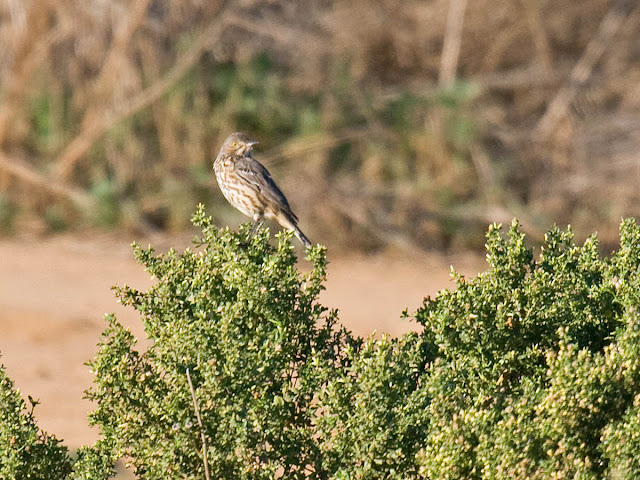Yesterday when I posted about the grassland birds I saw last week at the
Fiesta Island Dog Run, I didn't know I'd be going out this morning to look for the same birds. However, I went to a nearer location where Red-throated Pipits were reported. So, here's another post showing some of the same species reported in yesterday's post. But this time, I was successful in locating a Red-throated Pipit--a life bird!
A grassy field on Ponto Road in Carlsbad is also used as a dog run by local residents. It's a much smaller area with a dirt path/road around it. The field has scattered ice plant and other small weeds among the dirt--perfect for grassland birds such as pipits (70), horned larks (30), Say's phoebes (3), and meadowlarks (7). Since it was closer to home I could spend more time here.
 |
| American Pipit taking flight. |
The pipits were very flighty. When the dogs came by they all took flight, circled around and landed out away from everyone. As they chased caterpillars they'd spread out. Eventually, they'd all end up in the same general area, even out on the open dirt. By just standing patiently, they'd creep by or be flushed near over time.
 |
| American Pipit showing rather dull, plain solid brown back. |
The locomotion of pipits on the ground is rather steady walking with jerking head and bobbing tail. They stay pretty low and creep along horizontally as they walk, but then pull up suddenly to stop and look around before continuing on.
 |
| American Pipit with streaked breast and dark legs. Weak head pattern. |
The Horned Larks were actually much less wary. They would often surprise me by flying up from underfoot--even though I was going incredibly slow and taking a few steps and stopping to scan around. They wouldn't fly around as much as the pipits when disturbed; more often they would just walk away.
 |
| Horned Lark. |
Finally I spied the target pipit with the striped back and more contrasting plumage! The view was brief and rather distant. I never did hear it call, or if I did, it was not noticeably different from the American Pipits.
 |
| Red-throated Pipit showing dark-and-buff striped back and pink legs; yellowish throat of immature or winter adult. |
When other birders came I spotted it again--finally 4 times and over a minute! Peter Ginsburg showed up with his scope and I did get a distant scope view--just before the dogs chased their ball right through the flock and they flew to the opposite side.
 |
| Red-throated Pipit. Carlsbad, California. November 1, 2015. Greg Gillson. |
The Red-throated Pipit hid more in the thicker vegetation and little ruts and swales than the American Pipits did. So it was often many minutes between sightings. I was there for 2 hours and 40 minutes and saw the bird 4 times for less than 5 minutes total. I only moved a hundred feet or so across the field and back.
 |
| Red-throated Pipit showing strongly patterned facial markings; heavily streaked under parts. |
At first when you look over the sparsely vegetated field it doesn't appear as if there are any birds out there. But by concentrating on a more distant spot you catch the birds scurrying along in your peripheral vision. This type of birding requires patience and slow, methodical scanning of each bird, over and over again. It's not as exciting as other forms of bird watching, but the rewards can be worth it!
 |
| Red-throated Pipit showing strongly striped back and affinity for thicker vegetation. |
A bonus rare bird--a Sage Thrasher--also showed up. It's not as unusual as the Red-throated Pipit, but more regular in the Anza-Borrego desert in migration and winter, rather than along the coast. It had also been spotted by others earlier in the week.
 |
| Sage Thrasher. Carlsbad, California. November 1, 2015. Greg Gillson. |










No comments:
Post a Comment
I really want to hear from you! I've changed settings (again) in order to try to make commenting easier without opening it up to spammers. Please note, however, that comments to posts older than 14 days will be moderated. Thank you.